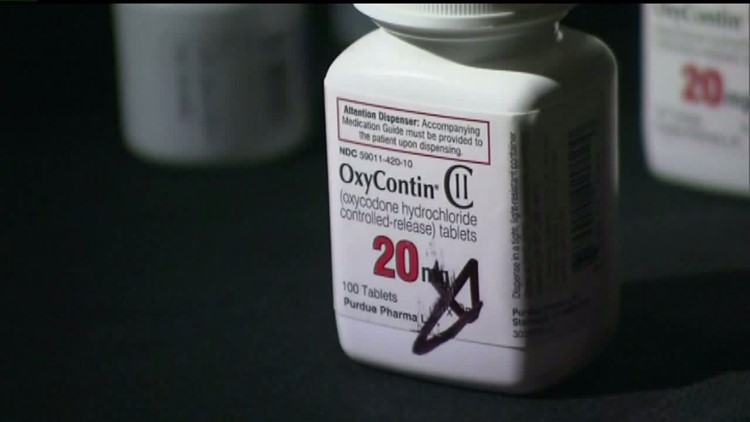MOSES LAKE, Wash. — A Moses Lake physician had her medical license revoked after an investigation into two patients' accidental overdoses and unprofessional conduct with another patient.
The Washington Medical Commission (WMC) revoked the medical license of Dr. Irene Kimura, who was licensed in 1992 as a physician and surgeon in Washington.
The WMC states Kimura practiced substandard prescribing and failed to conduct appropriate patient exams before prescribing opioids. Kimura's practice fell below the standard of care with patients who had known substance abuse issues, which was a contributing factor in two accidental overdoses.
Kimura is also accused of committing unprofessional conduct with another patient. According to the report, she requested a $25,000 loan from one of her patients, to whom she agreed to pay interest with under-the-table medication without a prescription.
Kimura didn't testify at the hearing, but she admitted to some of the allegations in her answer to the Amended Statement of Charges.
First incident Patient A
During three months in 2017, Kimura treated a 56-year-old male patient who had different medical health conditions. She first started treating the patient for complaints of uncontrolled chronic low-back pain.
Kimura prescribed the patient Oxycodone with the highest dose during his first visit despite the lack of information from prior records. In addition, she didn't review the patient's Prescription Monitoring Program (PMP) profile.
The report indicates the patient had a 58-day supply of opioids when Kimura prescribed oxycodone to him. Kimura also prescribed two medications that can cause sedation.
Before a second clinic visit, the patient was hospitalized after suffering an advertent overdose due to confusion about sedative dosing schedules.
After being released from the hospital, the patient attended a second clinic visit on Aug. 17, 2017, where he requested another prescription for pain despite opioid treatment. Kimura increased his daily medication and she failed to appropriately investigate the patient's pain symptoms.
On Sep. 3, 2017, Patient A was found dead, two days after filling the extended-release morphine prescription. His death was attributed to "mixed drug toxicity." The drug toxicity was the result of the combined effects of amitriptyline, nortriptyline, cyclobenzaprine and morphine.
Second incident Patient B
Kimura also treated Patient B, a 51-year-old woman, who was the widow of Patient A. Kimura started treating the woman a little over two weeks after her husband's death.
The woman suffered from different medical conditions, including shoulder pain. She had been prescribed opioids and benzodiazepine medications from numerous providers. Prior to visiting Kimura, the woman had been cut off from her medication after she admitted to another provider that she was addicted to opioids.
During the next three years that Kimura was the provider of Patient B, she did not review the woman's prior prescription and ignored her medical history of drug abuse. During that time, Kimura increased the woman's daily opioid dosage.
Between Aug. 2017 and Oct. 2019, Patient B had at least 29 emergency department visits. Most of those visits centered on requests for opioid pain medication.
The patient was admitted to an inpatient psychiatric clinic in March 2019, where she had contemplated overdosing on her opioid medication The woman provided verbal approval for Kimura to talk with her long-term outpatient psychiatrist about starting pain medications, but there is no documentation that Kimura actually contacted the psychiatrist. As a result, the doctor continued prescribing opioids to the patient.
Kimura refilled mental health medications while the patient was still being treated with other psychiatric medications prescribed by the psychiatrist.
The woman died on Feb. 25, 2020. The coroner's report determined that the cause of her death was accidental and due to the combined effects of oxycodone, lamotrigine, quetiapine, sertraline and doxepin.
Professional misconduct, Patient C
Kimura was the primary caretaker for Patient C, a 57- year-old man, from 2008 to 2021.
In 2013, Kimura told her patient she was going through financial difficulties and she requested to her patient a loan of approximately $25,000. Documents stated Kimura agreed to pay her patient interest payments on the loan by providing under-the-table medication without a prescription. Those medications included samples of Abilify, an antipsychotic medication.
Kimura continued treating the patient until around October 2021. In May of the following year, the patient died of a pulmonary disease.
At the time of the patient's death, Kimura still owed money on the loan as she periodically missed payments and stopped making payments altogether in November 2020.
With the help of a credible doctor, the WMC panel was able to determine that Kimura failed to meet the standard of care when treating Patients A, B, and C, her negligence increased the risk of harm to the three patients, and that negligence contributed to the deaths of Patient A and B.
"The panel finds that the license holder can never be rehabilitated and can never regain the ability to practice safety. As such, permanent revocation is necessary to adequately protect the public," WMC stated in the documents.
DOWNLOAD THE KREM SMARTPHONE APP
HOW TO ADD THE KREM+ APP TO YOUR STREAMING DEVICE
ROKU: add the channel from the ROKU store or by searching for KREM in the Channel Store.
Fire TV: search for "KREM" to find the free app to add to your account. Another option for Fire TV is to have the app delivered directly to your Fire TV through Amazon.
To report a typo or grammatical error, please email webspokane@krem.com.



